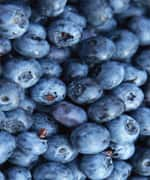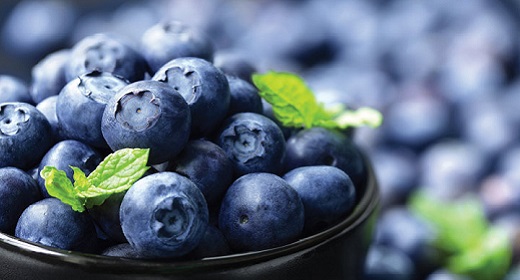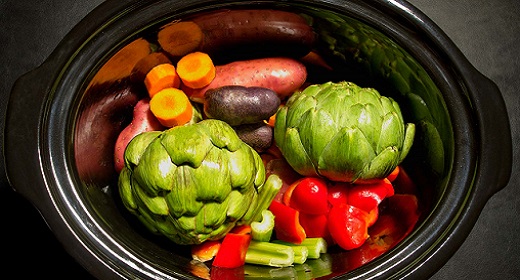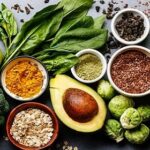by Walter Deriggio: Cellular DNA endures relentless injury through internal and external factors...
A fundamental problem with aging is faulty DNA repair.2 As we lose our ability to repair DNA, illness and death ensues. If we could perfect internal DNA repair processes, we would become incredibly resistant to degenerative disease.
Blueberry extracts have demonstrated robust DNA repair properties.
The memory-boosting and brain-protecting benefits of blueberries have long been a promising area of research.
Newer studies are showing that blueberries delay the aging process through a variety of mechanisms, including repairing DNA damage and favorably modulating genes associated with aging.3-7
The ability to repair DNA is an essential longevity mechanism. A fascinating laboratory study found that the compounds in blueberries could increase mean life span by 28%. In humans, that is equal to over 22 years!3
Particularly impressive is a study indicating that when added to a calorie-restricted diet, the compounds found in blueberries significantly increased life span beyond that of calorie restriction alone.
All of this adds up to a powerhouse fruit that could help us live longer and healthier.
Early Indications That Blueberries Promote Longevity

When scientists began investigating blueberries, they first discovered the fruit’s impact on reducing the age-accelerating effects of oxidative stress on tissues.8-11Blueberries are unique among fruits with their ability to not only quench destructive oxygen free radicals, but also to directly modulate genes that impart cells with their own protective mechanisms. Those genes produce enzymes such as superoxide dismutase and catalase that endow cells with the ability to capture and detoxify free radicals, producing harmless water molecules instead.12-14
Blueberry constituents do much more than fight oxidation. Studies are now revealing the powerful ability of blueberry polyphenols to modulate genes associated with aging itself, such as the Methuselah gene, which can promote an extension of up to 35% in the life span of fruit flies, a commonly studied organism in aging science.12,15,16
Studies in no fewer than three different species illustrate the value of blueberries in decelerating the aging process to produce significantly longer life spans.
The simplest multicellular organism used in aging research is the roundworm Caenorhabditis elegans, a minute worm measuring about 1.3 mm long, which is one of the most versatile animal models of aging.17,18
Studies reveal that treating C. elegans worms with blueberry polyphenols increased the animals’ mean life span by 28%.3 In human terms, that’s the equivalent of adding more than 22 years to the life of a 79-year-old person (the mean life expectancy of a male child born today).
C. elegans worms are extremely sensitive to temperature variations, and blueberry treatment increased the animals’ survival during acute heat stress.3 Treated worms also were much better able than non treated animals to resist induced aging stresses.
Indeed, blueberry treatments can prolong the life of the classic laboratory organism, the insect Drosophila melanogaster, better known as the fruit fly. Flies fed on blueberry extracts lived on average 10% longer than did control animals.12 This increase was accompanied by an increase of multiple beneficial genes, including protective enzymes and reduction of age-shortening genes. These healthy effects were apparent when flies were treated with an herbicide called paraquat, which normally imposes fatal age-accelerating changes in the flies’ metabolisms.12,19
Life Span Extension Beyond Calorie Restriction
Of course, roundworms and insects are far removed from human beings, and studies that show benefits in such animals must be reproduced in higher organisms in order to be applicable to humans. That has recently been done in laboratory mice.
In one study, the polyphenols from blueberries, pomegranate, and green tea extracts were combined into a nutrient cocktail added to mouse chow and the effects on the animals’ life span and biochemistry were examined.20 Middle-aged mice were placed on one of three dietary patterns:
- Control mice were allowed to eat as much as they wanted;
- An “intermittent feeding” group was fed only every other day to simulate the life-extending properties of calorie restriction;
- A third group received the polyphenol mixture in addition to calorie restriction.
As expected, both the calorie-restricted and the calorie-restricted-plus-polyphenol groups significantly outlived the control animals. What was remarkable, however, was that the calorie-restricted group that also was fed the nutrient polyphenols significantly outlived those on calorie restriction alone.20 This demonstrated the additive effect of the polyphenol mixture onto the known life-extending effect of calorie restriction. The brains of the polyphenol-supplemented animals showed reduction in the expressions of deleterious life-shortening genes.
What makes this study so noteworthy is that the longevity benefits of calorie restriction are so robust that it is difficult to improve on them. Yet adding extracts from blueberry, pomegranate, and green tea enabled life span extension in a mammal greater than calorie restriction alone.
Of course, in this study it is difficult to discern which of the extracts (blueberry, pomegranate, or green tea) may have been responsible for the observed life-extending effects. All three are rich in the anthocyanins that individually extend the life spans of “lower” laboratory animals. They also have specific effects that counteract age-related diseases that contribute to shortening life spans.20
Mechanisms Of Blueberries’ Life-Extending Properties
How do blueberries manage to prolong life and improve function so dramatically? We’re nowhere near a definitive answer, given the complexity of the berries’ biochemistry, but some key points are beginning to emerge, centered on the body’s own ability to repair itself.
Blueberries and their polyphenol components appear to be exceptionally good at promoting repair of DNA strands and at optimizing immunity at the cellular level.7,21,22 Both of these functions are essential for preventing senescent and environmental impacts that lead to cancer,23,24 cardiovascular disease,25,26 and loss of metabolic control,27,28 that underlies obesity and diabetes.
DNA, the molecular blueprint that contains instructions for all life functions, is a delicate molecule that, despite many protective mechanisms, readily suffers damage from oxidation, radiation, toxic chemicals,29,30 and other sources of stress. All living cells have evolved mechanisms to identify and repair broken DNA strands, which if left unrepaired, promote cancer and early cell death.31 Numerous studies now reveal that blueberry extracts both prevent DNA damage and promote its rapid and accurate repair.7,32-40
WHAT YOU NEED TO KNOW
 |
Blueberries Boost Longevity
- Blueberries and blueberry extracts have been proven to augment memory and cognitive abilities, but new research shows their effectiveness at decelerating the aging process in many organs.
- Studies in at least three animal species, including mammals, demonstrate compelling increases in longevity following blueberry supplementation.
- Cardiovascular diseases arise from many different factors; blueberry supplementation directly counteracts many of the most dangerous factors, including lipid disturbances, blood vessel stiffness, and vulnerability to infarction, thereby reducing the size and impact of tissue damage related to atherosclerosis.
- Metabolic syndrome, a collection of the consequences of modern lifestyles, threatens millions of lives each year through insulin resistance, high blood sugar, lipid anomalies, and hypertension. Blueberry constituents directly oppose each of metabolic syndrome’s components.
- Laboratory studies show that blueberry supplementation prevents or mitigates virtually each step in cancer development, from DNA damage to invasion of distant organs through metastasis.
- If you are seeking supplements to augment your body’s own natural defenses, to raise your disease resistance, and prolong your health span, give strong consideration to starting a blueberry extract supplement.
Human Study Corroborates DNA Protection
In an impressive human study, healthy volunteers ingested either 300 grams of ground blueberries or a control jelly with no blueberry components.41 Blood samples were taken before, and one, two, and 24 hours after the subjects took the study supplement. At the end of one hour, the amount of oxidation-induced DNA damage in blueberry-supplemented volunteers fell by 18% compared with control subjects. What makes this study particularly impressive is that this single, albeit large, serving of blueberries was able to suppress this amount of DNA damage so quickly.
Protecting Against Ultraviolet DNA Damage

Ultraviolet (UV) light produces DNA damage that plays an important role in causing a variety of diseases.
When scientists exposed cells in culture first to UV light and then to blueberry extracts, they found both a reduction in reactive oxygen species and reduced DNA damage.42
Closer examination showed that cells were protected even after DNA damage had occurred, the mechanism being related to decreased genetic expression of stress-induced signaling proteins. This study showed that blueberry anthocyanins protect DNA from damage and protect cells from the consequences of DNA damage that did occur.
Boosting Natural Killer Immune Cells
The actions of many immune system components decline with advancing age, in a degenerative process called immunosenescence.43,44 Controlling and slowing immune senescence is an attractive means of prolonging life and health. Blueberry extracts have been shown to have powerful anti-aging impacts on both cellular and molecular components of the aging immune system.
At the cellular level, blueberry extracts boosted the actions of natural killer (NK) cells charged with identifying and destroying abnormal cells such as those infected by viruses and those showing malignant changes.21,44,46
At the molecular level, blueberry anthocyanins sharply decreased activation of nuclear factor kappa-beta(NFk-b), an inflammation-generating molecule associated with cancer,47 heart disease,48 and other manifestations of chronic inflammation.49
Cardiovascular Health
Successful longevity requires more than just DNA repair and slowing immunosenescence. Increasing cardiac health and reducing the risk of cancer and diabetes are also part of the equation. Blueberry compounds play an active role in reducing these risks as well.
Increasing one’s intake of berry polyphenols is a proven means of protecting the heart, blood vessels, and brain against cardiovascular diseases such as heart attack and stroke, which remain among the top causes of death in American adults.50,51
Blueberries contain one of the highest concentrations of such polyphenols among common fruits, and these compounds have been shown to inhibit the dangerous oxidation of low density lipoproteins (LDL), the so-called “bad” cholesterol.50 Lipid oxidation constitutes one of the first steps in developing “plaques” that grow and become cholesterol-filled, inflammatory lesions that ultimately block blood vessels.52,53
In rats, a year-long diet regimen containing 2% blueberry supplement following experimentally induced heart attacks (myocardial infarction, or MI, produced by tying off one of the heart’s main arteries) was able to completely arrest expansion of the damaged area of heart tissue.54 Expansion of the MI area55 is a leading cause of the heart failure56,57 that so often follows a heart attack and produces much of the death and disability we associate with heart attacks. In this study, the death rate over the one year of the study was 22%lower in the supplemented animals compared with the control group. Blueberry-supplemented animals’ hearts showed less of the deleterious remodeling of the heart chambers that is also a hallmark of heart attack damage in humans.58,59
Another seminal study in rats showed that a three-month blueberry-supplemented diet produced a 24%increase in a measure of the resistance of energy-releasing heart mitochondria to stress.60 Remarkably, in animals then given a heart attack by tying off their coronary arteries, the size of the infarction (dead area) in the heart was 22% less in the supplemented than in the control animals, while the number of inflammatory cells was reduced by an impressive 40%.
When supplemented rats were put back on a regular diet (devoid of the blueberry extract), their infarcted (dead) heart lesions grew. When control rats were put on the blueberry supplement, their infarctions stopped expanding. This study indicates that if one suffers a blockage to their coronary artery when taking blueberry extract, the damage to their heart muscle will be lessened. If one suffers heart muscle damage from a coronary blockage, damage to their heart muscle might be halted if they initiate blueberry supplementation.
Blueberries and their polyphenols relax blood vessels, which in turn reduces blood pressure and may help to slow atherosclerosis. Human studies demonstrate reductions in both systolic (top) and diastolic (bottom) blood pressures.61 A decrease in systolic blood pressure is observed when animals are fed blueberry-supplemented diets, even when the diets are very high in fat.62,63 These effects could be related to blueberry polyphenol-induced modulation of nitric oxide, the signaling molecule that blood vessels use to relay information about blood flow and pressure, and to shift mineral ions such as potassium across cell membranes.62,64,65
There’s also growing evidence that blueberry polyphenols can induce favorable structural changes in blood vessel wall composition. This results in arteries becoming more elastic and less stiff, further reducing blood pressure and lowering atherosclerosis risk.50, 66
These kinds of favorable vascular changes have been shown in human studies when blueberry polyphenols were administered to healthy people.67 When a fairly high dose of 766 mg total blueberry polyphenol intake was given to human subjects, blood vessels smoothly dilated within an hour of the dose. Another study showed that in sedentary adults, a blueberry supplement produced reductions in aortic systolic blood pressure and in aortic stiffness.21 All of these changes are highly desirable for prevention of atherosclerosis and cardiovascular disease in general.
Indeed, in humans, a sharp reduction in cardiovascular risk factors was shown in people with metabolic syndrome, the cluster of obesity, blood sugar intolerance, and lipid disturbances that tremendously increase risk of a heart attack or stroke.68,69 After eight weeks of either blueberry supplementation (either 50 gramsfreeze-dried or 350 grams fresh berries), or control, subjects had a modest 6 and 4% reduction in average systolic (top) and diastolic blood pressures, compared to smaller reductions of 1.5 and 1.2% in control patients.61 Supplemented patients also showed a reduction in oxidized LDL cholesterol seen in the earlier animal studies.
Metabolic syndrome poses a major health threat for all of us, consisting as it does of the deadly combination of obesity with disturbances in metabolism of both fats and sugars. Blueberries and their extracts offer world-class protection in this area, as we’ll now see.
Reversing Markers Of Type II Diabetes

The epidemic of obesity has spawned a similar global rise in type II diabetes, with the resulting deadly condition often referred to as “diabesity.”70 Coupled with the consequences of a high-fat diet and little exercise,71 these preventable conditions produce metabolic syndrome, (abdominal obesity, glucose intolerance or “prediabetes,” elevated blood pressure, and abnormalities in lipid profile).51
Metabolic syndrome is now known to increase the risks for cardiovascular disease, diabetes, cancer, and neurodegenerative disorders. Inflammation is an inevitable characteristic of metabolic syndrome, which further increases the deadliness of its impact.69,72 Blueberries, with their high content of polyphenols, offer a potent and natural antidote to metabolic syndrome.
At the cellular level, blueberry extracts (including those of root, stem, leaf, and fruit) appear to improve glucose transport into cells, a critical mechanism for lowering blood sugar.73 Blueberry fruit extracts also enhance formation of new, insulin-producing pancreatic beta cells, which would otherwise die off as a consequence of high glucose levels.73
Specifically, the researchers measured the critical ability of cells in the pancreas to produce insulin in response to high glucose levels in the bloodstream. Scientists have discovered that high blood glucose levels damage insulin-producing cells in the pancreas over time, but if these same cells are treated with blueberry stem, leaf, and fruit extracts, the number of viable cells increases.73 This is a very desirable feature especially for people with early type II diabetes, in whom some sensitivity to native insulin production still remains.
Furthermore, the researchers tracked the source of the improved insulin response to a remarkable increase in replication of the remaining, growth-arrested beta cells by nearly 3-fold. In addition, they found that blueberry extracts from stem, leaf, and fruit could prevent the glucose-induced toxicity and subsequent death of neuronal cells by up to 33%. This finding has tremendous implications for prevention of neurodegenerative diseases such as Alzheimer’s, which has been called “type III diabetes” to acknowledge the important role played by glucose toxicity.74
The benefits of these effects can be seen in a human study, in which obese subjects, not yet diabetic, but with proven insulin resistance, consumed either a smoothie containing 22.5 grams of blueberry bioactive molecules or a smoothie of equal nutritional value but without blueberries, twice daily for six weeks.75 In the blueberry group, insulin sensitivity (the ability to remove glucose from the blood in response to insulin) rose to more than 4-fold that of the plain smoothie group, even without significant changes in adiposity or energy intake. Simply put, blueberry supplementation gave this high-risk group of patients vastly better natural control of their blood sugar.
Other studies in animals reveal powerful effects of blueberries on the other components of metabolic syndrome as well. In obese rats on a high-fat diet, adding freeze-dried whole blueberries to the diet reduced not only blood sugar and insulin resistance, but also lowered abdominal fat mass and triglyceride levels in blood.
SHOULD YOU EAT MORE BLUEBERRIES?
A growing number of human and animal studies supports the observations that blueberry extracts lower blood sugar, reduce blood lipid disturbances, improve the body’s responses to insulin, and boost fat and glucose burning.76, 77 Studies also show that blueberries or blueberry extracts reduce the accumulation of fat molecules inside of growing fat cells while improving the inflammatory profile of experimental animals.76, 78
Why not just eat the berries, and get the anthocyanins directly from your diet? For one thing, it would be prohibitively expensive, since whole-berry studies typically require 350 grams(about three-fourths of a pound) of berries daily to achieve effects. Of greater concern, however, is the finding that whole blueberries supplemented to animals consuming a high-fat diet produced significant increases in body weight and body fat (including dangerous visceral, or “belly” fat), compared with nonsupplemented, high-fat fed controls.79 On the other hand, the high-fat diet combined with blueberry extract high in anthocyanin content resulted in lower body weight gains and body fat compared with controls.
These findings were amplified and extended in a later study80 in which blueberry juice was compared with an extract enriched in blueberry anthocyanins. High-fat fed mice gained weight and had reduced percentages of lean body tissue compared with those fed a normal control diet, and of course had higher blood sugar levels as well. Feeding the animals either blueberry juice or the anthocyanin-rich extract kept body weight gain to the same levels as those fed a normal diet, but only the anthocyanin-rich extract also decreased visceral fat and lowered blood glucose levels back to those seen in control animals. In addition, the function of insulin-producing pancreatic beta cells was restored to normal in the anthocyanin-fed group, but not in the group fed blueberry juice alone.
Eating too many whole blueberries can offset the incredible benefits conferred by the natural polyphenolsthey contain. The cost of blueberry extract is also quite low in comparison to the whole fruit.
Blueberries And Cancer Prevention

With their powerful anti-inflammatory and gene regulatory properties, blueberries seem an ideal agent for preventing cancer. Human studies in cancer prevention are enormously difficult and time-consuming, but there is ample preclinical data available to support an important role for blueberries in the prevention of malignancies.
In addition to their unequalled content of bioactive anthocyanins and other polyphenols, blueberries are the single best source for pterostilbene, a close relative of resveratrol,81 which is also found in grape skins and other dark fruits.82
Pterostilbene, a compound found in blueberries has been called a “hallmark” anticancer agent, based on its ability to fight malignant change in several tissues, while producing negligible toxicity.82
Along with pterostilbene, the anthocyanins in blueberries exert a spectrum of effects all of which reduce the risk that a cell will become cancerous, and that an incipient cancer will grow, invade tissue, and metastasize to other body sites.82 Documented effects of blueberry bioactive molecules include:
- Prevention of DNA damage,7,32,35,83
- Arrest or alteration of the cell proliferation cycle to reduce the growth rate of cancerous cells,7,82,84
- Induction of the normal “programmed cell death” routine that is abnormal from malignant cells, allowing them to proliferate infinitely,7,83-88
- Prevention of tissue invasion and inhibition of metastasis by down-regulating “protein-melting” enzymes used by cancer cells to invade.82,87-91
Summary
Plants that live in challenging environments produce a wide array of stress-reducing nutrients to help them cope with extremes of temperature, humidity, nutrient availability, predators, and other threats. When humans consume those molecules, we get the benefit of that genetic stress resistance, which helps our bodies fight off major threats to our own well-being.
Blueberries, which grow in harsh, sandy soils, often in dry conditions and at high altitudes, contain the highest known concentrations of many such bioactive molecules. Research shows that, in addition to their ability to protect brain tissue and function from the ravages of aging, blueberries contribute to better health in most body systems.
Blueberries and their extracts now show promise in preventing and mitigating human cardiovascular disease, metabolic syndrome (which includes obesity, lipid disturbances, and hypertension), and cancer.
Daily supplementation with standardized blueberry extracts may help ward off life-shortening degenerative diseases currently treated with prescription drugs.
The most exciting finding, however, is that blueberry-pomegranate-green tea extracts may enable you to live significantly longer—even if you are already practicing calorie restriction.










































